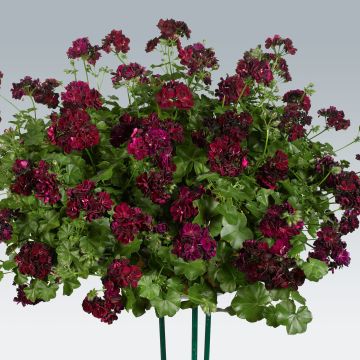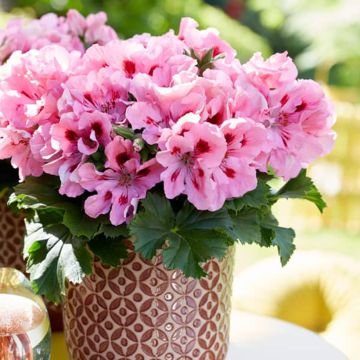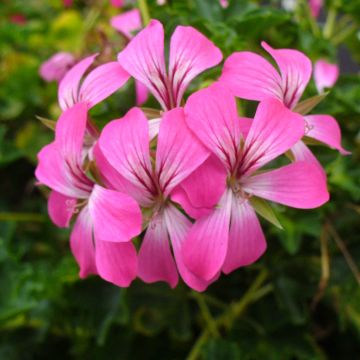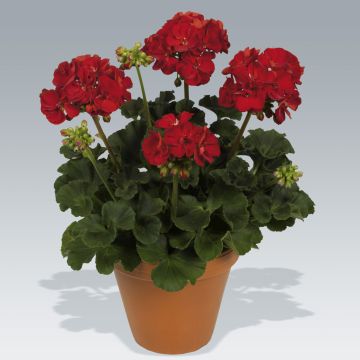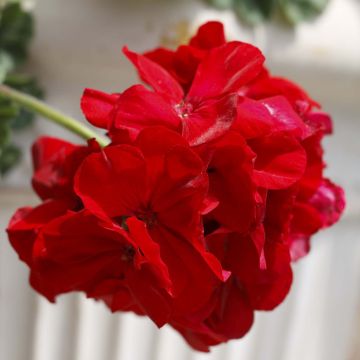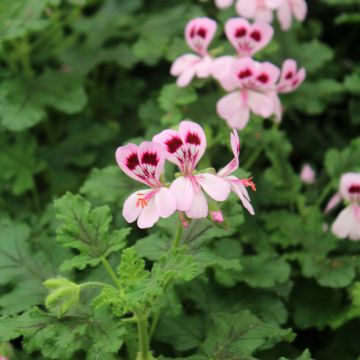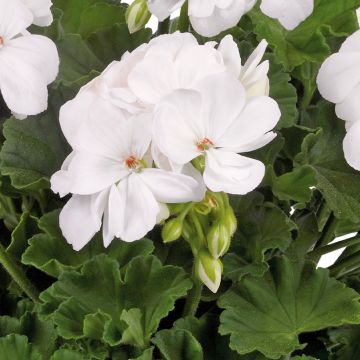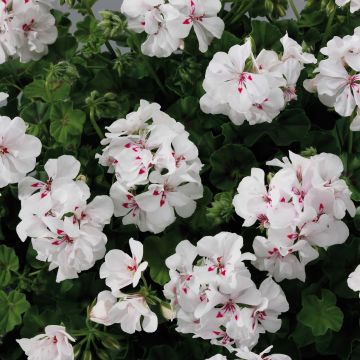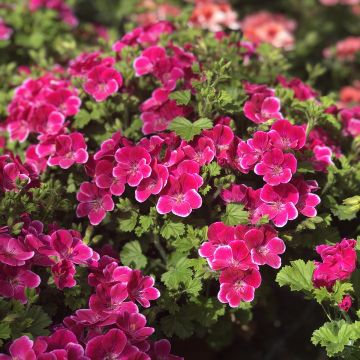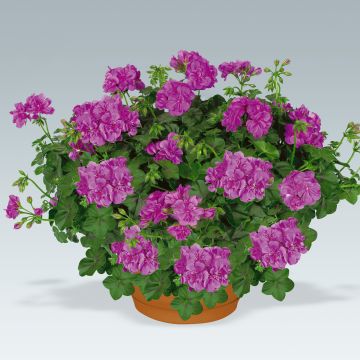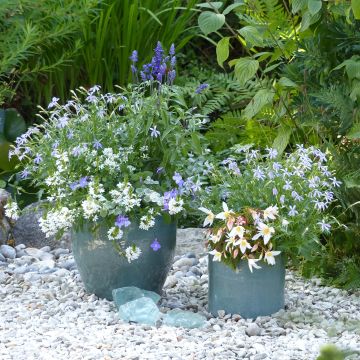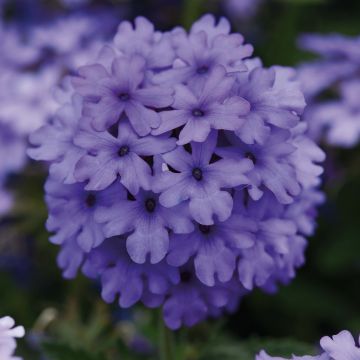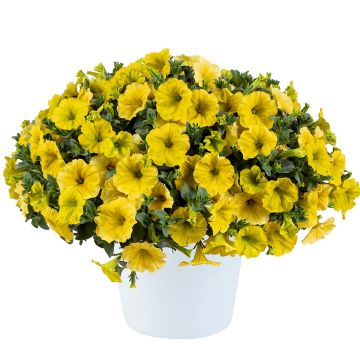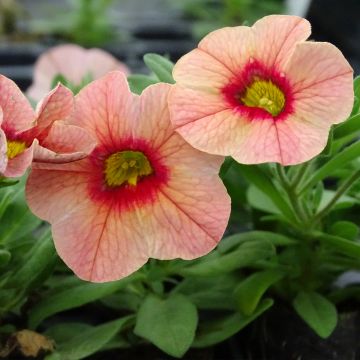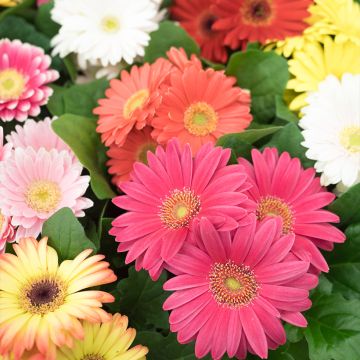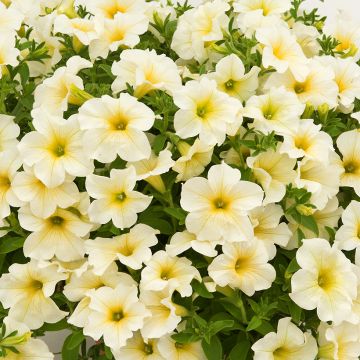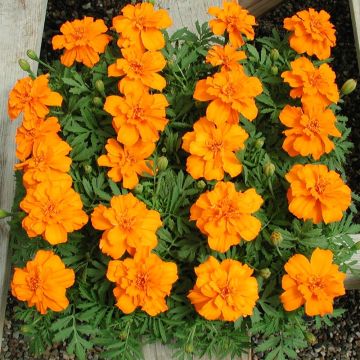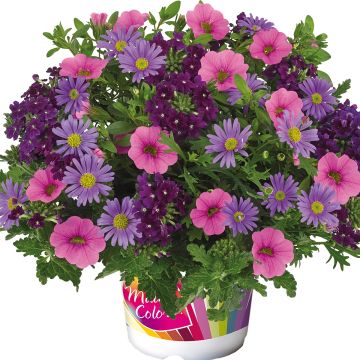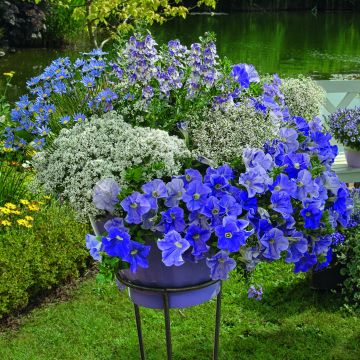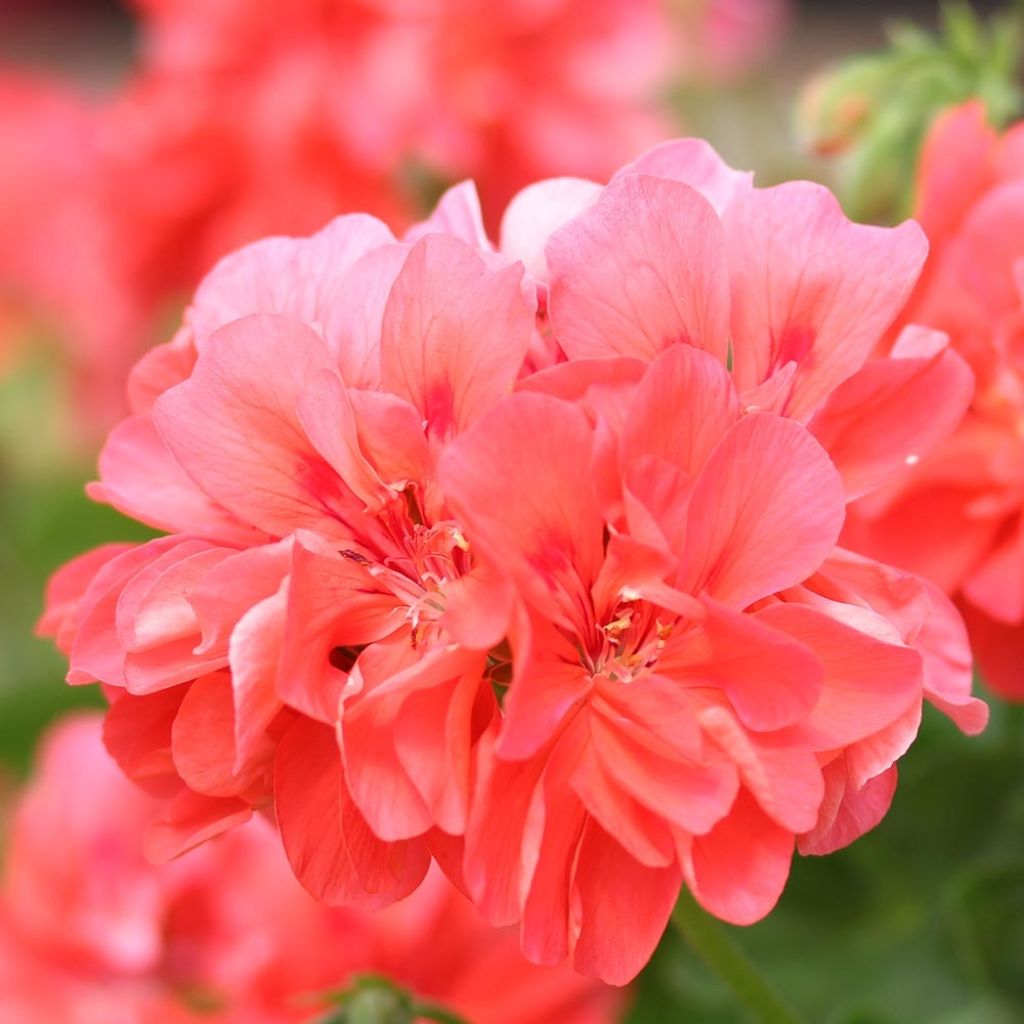

Géranium-lierre double Apricot Mini-mottes
Pelargonium Double Apricot - Ivy Geranium
Pelargonium peltatum Double Apricot
Ivy Geranium, Cascading Geranium
Mini plugs in perfect health
Muriel, 24/03/2021
This item cannot be shipped to the selected country
Delivery charge from €5.90
Delivery to Corse prohibited
More information
Schedule delivery date,
and select date in basket
This plant carries a 6 months recovery warranty
More information
We guarantee the quality of our plants for a full growing cycle, and will replace at our expense any plant that fails to recover under normal climatic and planting conditions.
From €5.90 for pickup delivery and €6.90 for home delivery
Express home delivery from €8.90.
Delivery to Corse prohibited: UE law prohibits the import of this plant from mainland France to Corse as part of the fight against Xylella fastidiosa. Please accept our sincere apologies.
More information
Does this plant fit my garden?
Set up your Plantfit profile →
Description
Pelargonium peltatum Double Apricot is a lovely variety of ivy-leaf geranium that will work wonders in flower boxes, balcony planters, and hanging baskets. Its long, flexible stems are adorned with shiny leaves of a vibrant green. The stems carry beautiful double bouquets in a delightful shade of pink. They continuously bloom from spring until the first frost, transforming the plant into a magnificent cascade of flowers.
This geranium is derived from Pelargonium peltatum, also known as P. hederaefolium or ivy-leaf geranium. It is a tender perennial plant of the geranium family, with ancestors from South Africa. It is of horticultural origin. This hybrid is characterised by its trailing or cascading habit and long stems adorned with shiny, lobed leaves that theoretically persist through winter if the plant is kept frost-free. It is hardy to about -4°C (24.8°F), so it is usually grown as an annual in our climate.
In just a few weeks, this variety forms a bushy, semi-trailing clump measuring approximately 35cm (14in) in height and 45cm (18in) in diameter. Its leaves are circular, leathery and palmate, with pointed lobes. The leaves are initially light green, before turning to a vibrant green when mature. The flowering occurs from April-May until the first frosts, with a peak in July-August. The double flowers are rounded and fully open in a fresh pink colour. They are grouped in small bouquets.
Ivy-leaf geraniums are generous and undemanding plants, perfect for decorating pots for a large part of the year. Plant them en masse, combining different colours, to create a lasting and cheerful display throughout summer. These plants can be used to cascade from a planter, a raised pot, or a hanging basket. They can also be grown as ground cover in flower beds, where they tolerate water scarcity very well. Depending on the preferences of each gardener, this variety can be paired with verbenas, blue lobelias, morning glories, Million Bells, Madagascan periwinkles, Dichondra 'Silver Falls', bidens, or even diascias, for example.
Please be aware that our young plug plants are professional products intended for experienced gardeners. Upon receipt, repot and store them under cover (veranda, greenhouse, cold frame) at a temperature above 14°C (57.2°F) for a few weeks before planting them outdoors, once the risk of frost has definitely passed.
Report an error about the product description
Pelargonium Double Apricot - Ivy Geranium in pictures
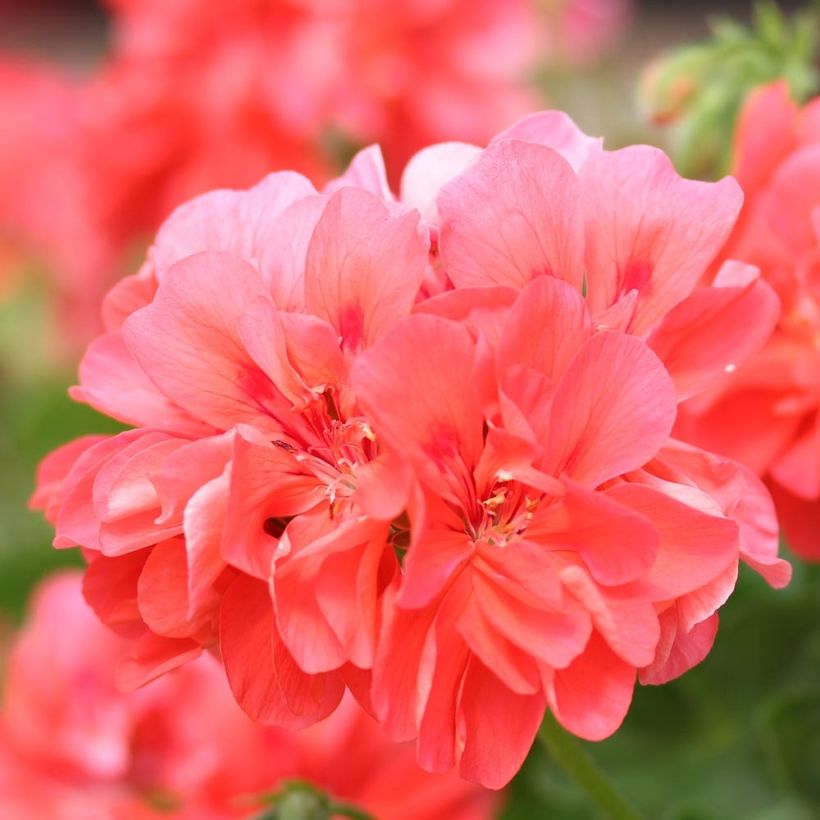

Flowering
Foliage
Plant habit
Botanical data
Pelargonium
peltatum
Double Apricot
Geraniaceae
Ivy Geranium, Cascading Geranium
Cultivar or hybrid
Other Pelargonium - Geranium
Planting and care
You can plant your geraniums in the ground or in a pot. If you want to plant them in the ground, wait until the last frost has passed. In the meantime, you can pre-cultivate them in a pot in a warm and bright place to accelerate their growth.
Geraniums will bloom for a long period of time. Plant them in a sunny or partially shaded location, sheltered from strong winds. They need light, humus-rich, well-drained soil. They do not like stagnant humidity. Do not water them too much at the beginning of the growing season as they are sensitive to excess moisture. They tolerate drought well, but will need regular watering during hot summer temperatures, especially when grown in pots. Geraniums are susceptible to frost (minimum -4°C (24.8°F)).
These floriferous and fast-growing plants are hungry. We recommend feeding them with a liquid geranium fertiliser once or twice a week during the growing season.
Remove faded flowers and dry leaves as they appear to keep the plants looking beautiful and extend the flowering period.
As geraniums are susceptible to frost, they need to be stored indoors during winter. In spring, repot them before bringing them back outside.
Planting period
Intended location
Care
-
, onOrder confirmed
Reply from on Promesse de fleurs
Plug plants - Annuals
Haven't found what you were looking for?
Hardiness is the lowest winter temperature a plant can endure without suffering serious damage or even dying. However, hardiness is affected by location (a sheltered area, such as a patio), protection (winter cover) and soil type (hardiness is improved by well-drained soil).

Photo Sharing Terms & Conditions
In order to encourage gardeners to interact and share their experiences, Promesse de fleurs offers various media enabling content to be uploaded onto its Site - in particular via the ‘Photo sharing’ module.
The User agrees to refrain from:
- Posting any content that is illegal, prejudicial, insulting, racist, inciteful to hatred, revisionist, contrary to public decency, that infringes on privacy or on the privacy rights of third parties, in particular the publicity rights of persons and goods, intellectual property rights, or the right to privacy.
- Submitting content on behalf of a third party;
- Impersonate the identity of a third party and/or publish any personal information about a third party;
In general, the User undertakes to refrain from any unethical behaviour.
All Content (in particular text, comments, files, images, photos, videos, creative works, etc.), which may be subject to property or intellectual property rights, image or other private rights, shall remain the property of the User, subject to the limited rights granted by the terms of the licence granted by Promesse de fleurs as stated below. Users are at liberty to publish or not to publish such Content on the Site, notably via the ‘Photo Sharing’ facility, and accept that this Content shall be made public and freely accessible, notably on the Internet.
Users further acknowledge, undertake to have ,and guarantee that they hold all necessary rights and permissions to publish such material on the Site, in particular with regard to the legislation in force pertaining to any privacy, property, intellectual property, image, or contractual rights, or rights of any other nature. By publishing such Content on the Site, Users acknowledge accepting full liability as publishers of the Content within the meaning of the law, and grant Promesse de fleurs, free of charge, an inclusive, worldwide licence for the said Content for the entire duration of its publication, including all reproduction, representation, up/downloading, displaying, performing, transmission, and storage rights.
Users also grant permission for their name to be linked to the Content and accept that this link may not always be made available.
By engaging in posting material, Users consent to their Content becoming automatically accessible on the Internet, in particular on other sites and/or blogs and/or web pages of the Promesse de fleurs site, including in particular social pages and the Promesse de fleurs catalogue.
Users may secure the removal of entrusted content free of charge by issuing a simple request via our contact form.
The flowering period indicated on our website applies to countries and regions located in USDA zone 8 (France, the United Kingdom, Ireland, the Netherlands, etc.)
It will vary according to where you live:
- In zones 9 to 10 (Italy, Spain, Greece, etc.), flowering will occur about 2 to 4 weeks earlier.
- In zones 6 to 7 (Germany, Poland, Slovenia, and lower mountainous regions), flowering will be delayed by 2 to 3 weeks.
- In zone 5 (Central Europe, Scandinavia), blooming will be delayed by 3 to 5 weeks.
In temperate climates, pruning of spring-flowering shrubs (forsythia, spireas, etc.) should be done just after flowering.
Pruning of summer-flowering shrubs (Indian Lilac, Perovskia, etc.) can be done in winter or spring.
In cold regions as well as with frost-sensitive plants, avoid pruning too early when severe frosts may still occur.
The planting period indicated on our website applies to countries and regions located in USDA zone 8 (France, United Kingdom, Ireland, Netherlands).
It will vary according to where you live:
- In Mediterranean zones (Marseille, Madrid, Milan, etc.), autumn and winter are the best planting periods.
- In continental zones (Strasbourg, Munich, Vienna, etc.), delay planting by 2 to 3 weeks in spring and bring it forward by 2 to 4 weeks in autumn.
- In mountainous regions (the Alps, Pyrenees, Carpathians, etc.), it is best to plant in late spring (May-June) or late summer (August-September).
The harvesting period indicated on our website applies to countries and regions in USDA zone 8 (France, England, Ireland, the Netherlands).
In colder areas (Scandinavia, Poland, Austria...) fruit and vegetable harvests are likely to be delayed by 3-4 weeks.
In warmer areas (Italy, Spain, Greece, etc.), harvesting will probably take place earlier, depending on weather conditions.
The sowing periods indicated on our website apply to countries and regions within USDA Zone 8 (France, UK, Ireland, Netherlands).
In colder areas (Scandinavia, Poland, Austria...), delay any outdoor sowing by 3-4 weeks, or sow under glass.
In warmer climes (Italy, Spain, Greece, etc.), bring outdoor sowing forward by a few weeks.

































